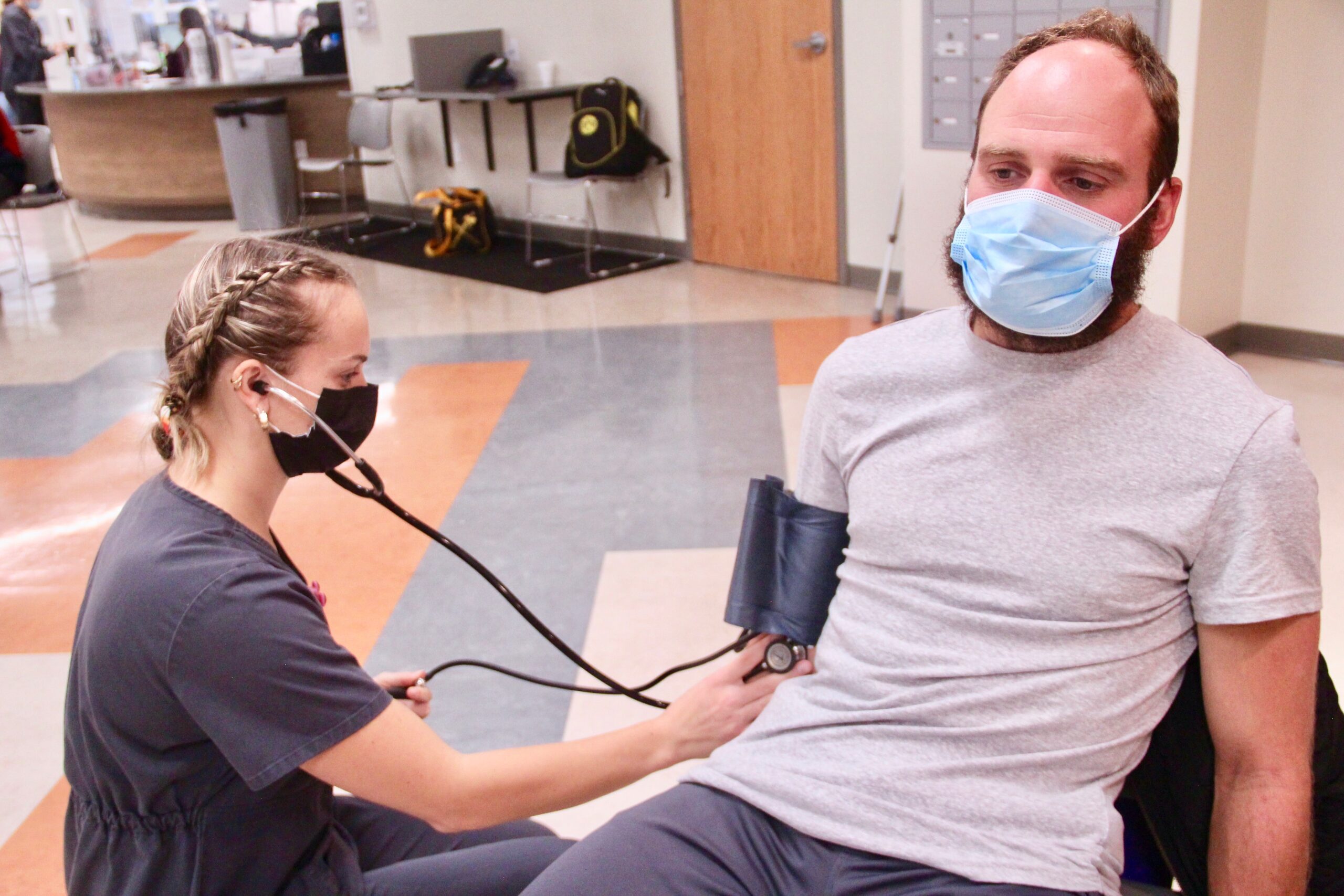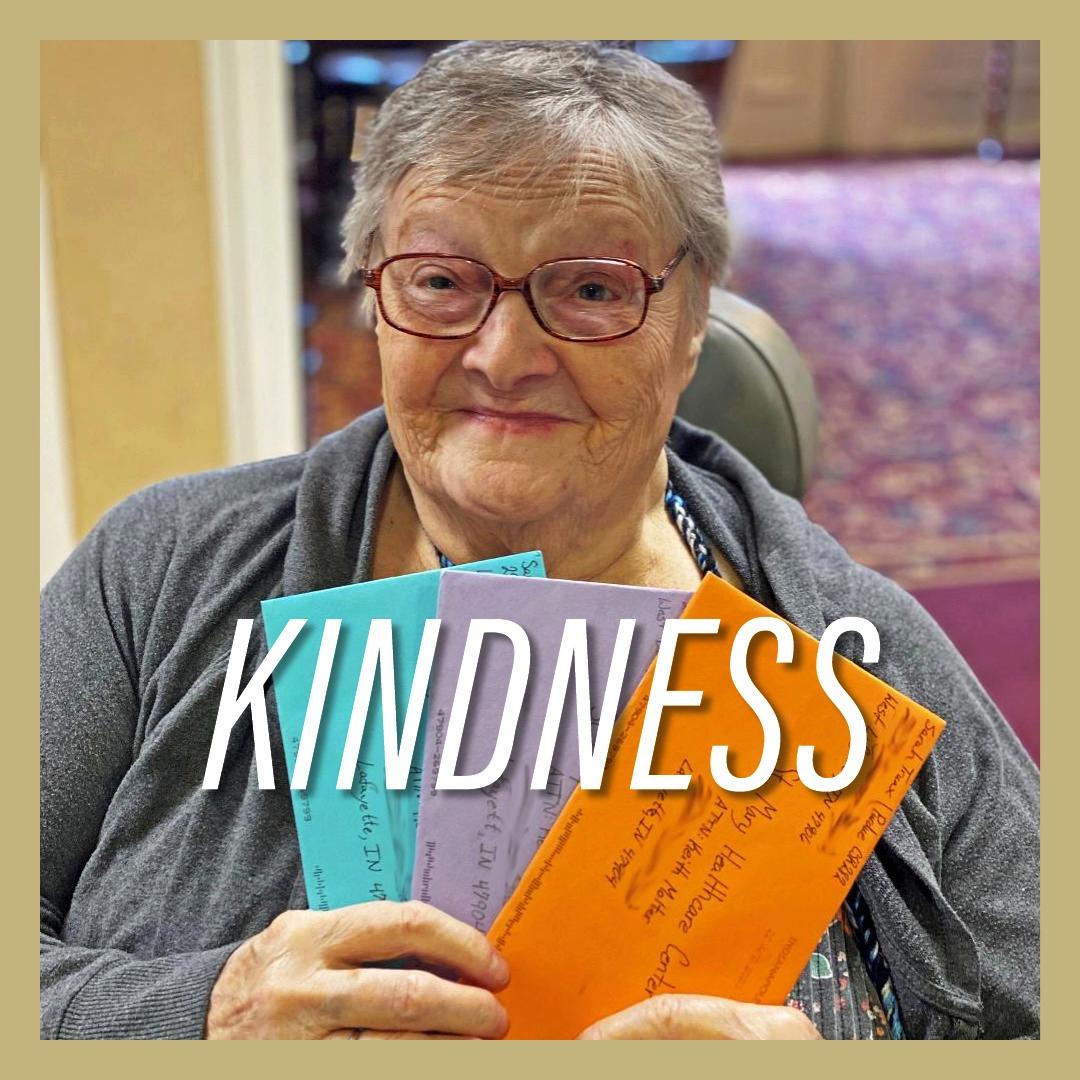Real people, real impact: Service learning benefits HHS students and community

Purdue Nursing senior Kenzie Stitt checks the blood pressure of Tommy, a Lafayette Transitional Housing Center guest. Stitt and her classmates have gained valuable experience while bettering their community through this service learning opportunity.Tim Brouk
Written by: Tim Brouk, tbrouk@purdue.edu
Several programs in the Purdue University College of Health and Human Sciences urge their students to use what they learn in the classroom to benefit off-campus communities. Service learning can also benefit the student’s character and career path.
For several years, Jennifer Dobbs-Oates, clinical associate professor in the Department of Human Development and Family Studies, required students in her HDFS 33100 (Skills for Helping Professionals in Individual, Family and Group Settings) class to find their own community partners to work with and apply the group facilitation skills learned in the class. The reports she would receive back were overwhelmingly positive. These successes made Dobbs-Oates the right candidate for the director position in Purdue’s new Office of Experiential Education, where service learning is a major component.
“Service learning is a tremendous opportunity, one that students get really excited about,” Dobbs-Oates said. “They get a chance to use the expertise they’re developing, and they get a chance to see how that plays out in the real world, and our partners in the community get to benefit from all of the energy, intelligence and motivation Purdue students have to offer.”
Examples of service learning from Dobbs-Oates’ classes include students leading meetings for the YWCA Greater Lafayette Domestic Violence Intervention program and Recovery Café Lafayette in the Bauer Family Resource Center. She is working to get more Purdue programs to embrace service learning. Even just a handful of hours volunteering could pay tremendous dividends before and after graduation. The student’s resume and community are strengthened.
“When students are doing service learning, they’re getting a chance to see how the things they’re learning really matter and how they really get used in a context beyond the classroom that they’re typically exposed to,” Dobbs-Oates explained. “Then, they have a very meaningful story that they can tell, whether they’re in a job interview or they’re writing a personal statement for graduate school. The folks who are selecting our students into those next opportunities want to know ‘Why does what you learn matter? How can you bring it to use in your next step?’”
‘People different than themselves’

A St. Mary’s Healthcare resident holds letters Customer Relations Management students wrote her during the COVID-19 pandemic.Photo provided
Lecturer Keith Molter’s CSR 28200 (Customer Relations Management) class requires six to eight hours of service learning for every student. Over the 10 years he has had it as part of this class, Molter has developed working relationships with Greater Lafayette organizations like St. Mary Healthcare Center and Food Finders Food Bank, which is led by hospitality and tourism alumna Kier Crites Muller.
Molter said he has seen his students make significant impacts, even during just an hour or two, working with the residents at St. Mary’s, especially during the COVID-19 pandemic. During lockdown, students wrote letters to them, which elated the isolated men and women. When the facility was reopened to in-person volunteers, Molter’s students were some of the only visitors some residents received.
“This gets students to work with people different than themselves,” Molter said. “All kinds of studies have shown community service is good for business and good for your mental health and growth.”
Kelsie Busby, a junior studying selling and sales management, already logged nine hours at the Lyn Treece Boys & Girls Club of Tippecanoe County. She said she had never heard of the Boys & Girls Club before she participated in shifts at the Lafayette facility. There, she helped children with their spelling and math homework and played many spirited games of air hockey. During the activities, she got to know some of the kids and Busby’s eyes were opened to different perspectives.
“It wasn’t really what I expected at all,” she said. “A lot of these kids open up about some things they notice about society, and I realized how smart some of these really young kids are. Some were excited to see me when I came back the next week.
“Using this experience will definitely help with my communication and interaction with people of all ages going forward when I pursue my career. … I will say this has been one of my favorite classes at Purdue.”
‘Elevates their leadership’
The Department of Health and Kinesiology offers service learning in several classes. Before the pandemic, one successful program saw students lead physical education classes for area homeschooled children. Since 2004, 30 to 40 boys and girls ranging from second to sixth grade would come to the department’s home base of Lambert Fieldhouse every semester to develop skills, engage in physical activity and learn how fitness enhances their overall health.
“Active kids are better learners. They’re more focused. Physical activity is fertilizer for their brains.” said Carole DeHaven, health and kinesiology senior lecturer.
Other health and kinesiology service learning opportunities have students lead physical education classes at area elementary schools. Students in HK 32600 (Foundations of Adapted Physical Education) visit community centers to teach children with special needs. Every one of DeHaven’s students work with kids or adults involved in Tippecanoe County Special Olympics. This fall, the students are helping the athletes learn and play football and bowling or helping them get their steps in via a walking club.
“They learn content and theory, and the application is through the service they give to the children in the community,” DeHaven said. “It also elevates their leadership. Our students learn to lead by participating in real-world experiences in our own community. I think they learn more about themselves while fulfilling a need that exists in many of these partnerships.”
‘Brings the classroom to life’
The Department of Speech, Language, and Hearing Sciences (SLHS) provides numerous clinical services to the community. Housed in Lyles-Porter Hall, the programs host hearing, speech, language, balance and swallowing evaluations and treatments. These are conducted by students with faculty supervision, providing the young scholars early, quality clinical experience. All of the clinics have observation opportunities for underclassmen to soak up techniques, procedures and patient rapport early.
SLHS programs also host Wellness Screening Days for the community, which give students more hands-on opportunities to give fast speech, language and hearing screenings. Participants who do poorly on the screenings are encouraged to come back for more in-depth testing.
“It’s one of their favorite things to do,” said Jennifer Simpson, clinical professor and associate head of SLHS, of her students’ service learning. “It brings the classroom to life. Everything you study or everything you might want to do, you see it in-person, in-action.”
‘Very meaningful for them’
As part of his NUR 41500 (Public Health Nursing Clinic) class, Eric Palmer, a School of Nursing clinical assistant professor, requires his students to have clinical rotations at Lafayette Transitional Housing Center (LTHC). Several students work in the facility’s medical respite area and engagement center conducting health and wellness assessments three days a week. The students check blood pressure, listen for breathing issues and other first aid needs. Many of the guests at LTHC suffer from chronic and acute health problems.
“We do a little bit of everything there,” Palmer said. “We bandage wounds. We do a lot of talking with people and helping point them in a direction of services. It’s been a pretty great opportunity.”
Nursing students like senior Dana Christiansen practice their skills while broadening their view on people experiencing homelessness. Set to graduate in December, she was thankful to experience service learning as a student.
“It’s been, definitely, a humbling experience being able to serve the community that I lived in the last four years. I didn’t quite realize the severity of the amount of individuals that are experiencing homelessness within Tippecanoe County,” Christiansen said. “Just being able to serve that vulnerable population has been an amazing experience. I’ve learned a lot from them. It’s amazing what they do over there.”
Jennifer Shook, LTHC chief development officer, noticed her guests are grateful for the students’ care and attention. It’s much more than changing a bandage for that person experiencing homelessness.
“For me and for LTHC, the real benefit is what you see the guests experiencing,” she said. “For them to have people that really care about them and care about what’s going on with them and has the time to listen to their concerns, it’s very meaningful for them.”
Discover more from News | College of Health and Human Sciences
Subscribe to get the latest posts sent to your email.